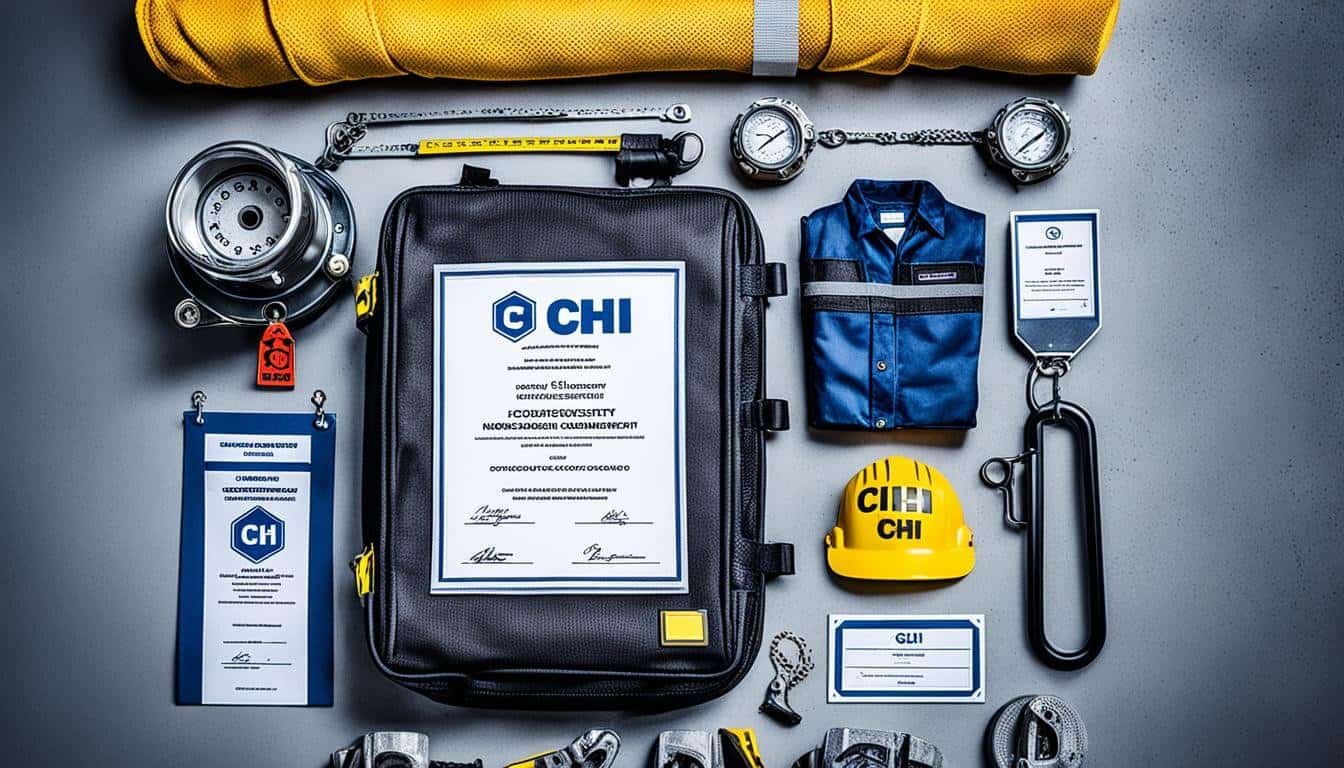Certified Industrial Hygienist (CIH)
Did you know that workplace illnesses and injuries cost the global economy over $3.9 trillion each year? The impact of occupational hazards on workers and the public is staggering, emphasizing the urgent need for professionals who specialize in mitigating these risks. Certified Industrial Hygienists (CIHs) are the dedicated experts who safeguard our well-being by anticipating, recognizing, evaluating, and controlling workplace hazards.
- CIHs are globally recognized experts in protecting the health and safety of workers and the public.
- They assess and control chemical, physical, ergonomic, and biological hazards in various workplaces.
- Becoming a CIH requires meeting education and experience requirements, passing a comprehensive exam, and maintaining ongoing professional development.
- CIH certification offers career advancement opportunities and enhances credibility in the industrial hygiene field.
- CIHs play a vital role in promoting workplace safety and preventing occupational illnesses and injuries.
What Does a CIH Do?
Certified Industrial Hygienists (CIHs) play a crucial role in safeguarding the health and safety of workers in various industries. They specialize in industrial hygiene, which involves assessing and controlling workplace hazards to prevent occupational illnesses and injuries. CIHs utilize their expertise in occupational health assessment, workplace exposure assessment, and industrial hygiene practices to create safer work environments.
CIHs are responsible for conducting comprehensive assessments of workplaces to identify potential health and safety hazards. They evaluate exposure to hazardous materials, monitor air quality, analyze chemical samples, and assess ergonomic factors. By conducting these assessments, CIHs ensure that workers are protected from potential risks and hazards in their workplace.
Once hazards are identified, CIHs develop and implement strategies to control and mitigate these risks. They work closely with employers to establish measures to minimize exposures and promote a healthy work environment. CIHs ensure compliance with safety regulations and industry standards, ultimately reducing the risk of occupational illnesses and injuries.
With their extensive knowledge and experience in industrial hygiene, CIHs play a vital role in promoting workplace safety. By conducting thorough assessments, implementing control measures, and evaluating exposures, CIHs contribute to the prevention of occupational hazards and the overall well-being of workers.
CIHs utilize their expertise in occupational health assessment, workplace exposure assessment, and industrial hygiene practices to create safer work environments.
CIH Certification Process
To become a Certified Industrial Hygienist (CIH), individuals must meet specific requirements set by the Board of Certified Safety Professionals (BCSP). These requirements include completing a designated number of education and experience hours in industrial hygiene, passing an ethics course, and obtaining professional references to validate their work experience. Candidates also need to pass the CIH comprehensive exam, which covers various subject areas such as air sampling, toxicology, engineering controls, and more. The certification process ensures that CIHs possess the necessary knowledge and skills to practice industrial hygiene effectively.
Becoming a CIH involves meeting rigorous criteria set by the Board of Certified Safety Professionals (BCSP). It confirms that individuals have the competence to address industrial hygiene challenges and protect workers’ health and safety. The certification process includes the following steps:
- Education Requirements: Candidates must complete a specific number of education hours in industrial hygiene, which may include coursework, seminars, and conferences. This ensures that CIHs acquire a strong foundation in essential concepts and principles.
- Experience Requirements: Candidates need to accumulate a certain number of experience hours in industrial hygiene. This practical experience enables CIHs to apply their knowledge in real-world scenarios and handle diverse occupational health hazards effectively.
- Ethics Course: As part of the certification process, candidates must complete an ethics course that emphasizes professional integrity, ethics, and responsibilities in the practice of industrial hygiene.
- Professional References: Candidates must provide professional references from individuals who can validate their work experience and attest to their competence in industrial hygiene.
- CIH Comprehensive Exam: To obtain CIH certification, candidates need to pass a comprehensive exam administered by the BCSP. The exam assesses their knowledge and skills across multiple subject areas, including air sampling, toxicology, engineering controls, risk assessment, and more.
Successful completion of the CIH certification process demonstrates that individuals have met the high standards set by the BCSP and validates their expertise in industrial hygiene. It ensures that CIHs possess the necessary qualifications to protect workers and enhance workplace safety.
Benefits of CIH Certification
Holding the CIH certification offers several benefits for professionals in the field of industrial hygiene. Certified Industrial Hygienists (CIHs) are recognized as experts in workplace health and safety, which enhances their career opportunities. CIH certification demonstrates a commitment to professional development and staying current with the latest industry practices. It also provides a competitive edge in job applications and promotions, as employers often value the expertise and credibility that comes with CIH certification. Additionally, CIHs gain access to a network of professionals and resources that support ongoing learning and growth in the field.
“CIH certification has opened up numerous opportunities for career advancement. Employers value the knowledge and skills that come with the certification, and it has played a crucial role in my professional growth.”
– John Smith, CIH
Workplace health and safety is a top priority for organizations across industries. By obtaining the CIH certification, professionals can contribute to creating safer work environments, protecting employees from occupational hazards, and ensuring compliance with safety regulations. CIHs play a critical role in conducting workplace assessments, identifying potential risks, and implementing strategies to mitigate these hazards. Their expertise helps prevent occupational illnesses and injuries, promoting the well-being of workers and the overall success of organizations.
Benefits of CIH Certification
| Benefits | Description |
|---|---|
| Career Advancement | CIH certification enhances career opportunities and provides a competitive edge in job applications and promotions. |
| Professional Recognition | CIHs are recognized as experts in workplace health and safety, gaining credibility and respect in the field. |
| Access to Resources | CIHs gain access to a network of professionals and resources that support ongoing learning and growth in the field. |
CIH certification not only benefits individuals but also contributes to the overall advancement of the industrial hygiene profession. By upholding high standards of practice and promoting the importance of workplace health and safety, CIHs play a crucial role in improving industry-wide standards and the well-being of workers.
Testimonials from CIH Certificants
The CIH certification has garnered high praise from professionals in the field of industrial hygiene, with many certificants sharing their testimonials about the impact and satisfaction they have experienced. Here are a few testimonials that highlight the professional accomplishments, career satisfaction, and commitment to workplace health and safety demonstrated by CIH certificants:
“Obtaining my CIH certification was a significant milestone in my career. Not only did it enhance my professional credibility, but it also instilled a sense of accomplishment and responsibility. Being a CIH means having the knowledge and skills to ensure the well-being of workers and protect them from occupational hazards.” – John Robertson, CIH
“Becoming a CIH has truly changed my perspective on workplace safety. Knowing that I have the expertise to assess and control hazards brings a great sense of pride and satisfaction. Being able to contribute to a safe and healthy work environment is a reward in itself.” – Sarah Thompson, CIH
“The CIH certification has opened new doors for me in my career. Employers value the expertise and recognition that comes with CIH certification. It has allowed me to take on challenging projects, lead safety initiatives, and make a significant impact on workplace health and safety.” – David Nguyen, CIH
These testimonials showcase the personal and professional growth that comes with achieving the CIH certification. CIH certificants take pride in their ability to contribute to a safer and healthier world, and their accomplishments serve as a testament to the importance of this credential in the field of industrial hygiene.
Testimonials from CIH certificants underline the significant impact of the certification on both individuals and the industry as a whole. Their stories reinforce the value of CIH certification in promoting workplace health and safety, and the commitment of CIHs to continuous improvement and protecting workers’ well-being.
CIH Exam Overview
The Certified Industrial Hygienist (CIH) exam is a comprehensive assessment that evaluates candidates’ knowledge and skills in the field of industrial hygiene. This exam plays a crucial role in determining a candidate’s ability to effectively address workplace hazards and protect the health and safety of workers and the public. Understanding the format and scoring of the CIH exam is essential for success.
Exam Format
The CIH exam consists of 180 multiple-choice questions that cover a broad range of subject areas relevant to industrial hygiene. These subject areas include air sampling, toxicology, engineering controls, risk assessment, and more. The questions are designed to assess a candidate’s understanding of key concepts, principles, and best practices in industrial hygiene. The exam is divided into two sections, with a break provided between the sections to allow candidates to recharge and refocus.
During the exam, candidates have the flexibility to review and revisit questions within each section. This feature enables candidates to carefully consider their answers and make any necessary adjustments before moving on to the next question. It is important to utilize this review feature effectively to ensure accurate responses and maximize scoring potential.
Exam Scoring
The scoring of the CIH exam is based on the number of correct answers. There is no penalty for incorrect responses, so it is beneficial for candidates to attempt all questions to increase their chances of obtaining a higher score. Each correct answer contributes to the candidate’s overall score, and there is a passing score determined through a rigorous standard-setting process. This process ensures that candidates are evaluated fairly and consistently, regardless of the specific exam version they take.
Preparing thoroughly for the CIH exam is essential to achieving a passing score. Candidates should allocate sufficient time for studying, utilizing resources such as study guides, reference materials, and practice exams. Practice exams can help candidates familiarize themselves with the exam format, improve their time management skills, and identify areas that require additional review.
| Exam Overview | Key Points |
|---|---|
| Exam Format | 180 multiple-choice questions Divided into two sections Review and revisit questions |
| Exam Scoring | Number of correct answers No penalty for incorrect responses Passing score determined through standard-setting process |
CIH Exam Preparation
Adequate preparation is crucial for success in the CIH exam. To enhance their knowledge and understanding of the subject matter, candidates can utilize various study materials and resources. These resources include:
- Textbooks
- Reference materials
- Online courses
- Practice exams
Reviewing sample questions allows candidates to familiarize themselves with the exam format and question types. It is recommended to create a study plan, allocate sufficient time for preparation, and focus on areas where additional review is needed. Practice exams can help candidates assess their readiness for the actual CIH exam.
Effective exam preparation techniques include:
“By utilizing a combination of study materials, allocating sufficient time for preparation, and practicing with sample questions, candidates can greatly increase their chances of success in the CIH exam.”
Sample CIH Exam Preparation Plan
| Week | Study Task |
|---|---|
| 1 | Review foundational concepts in industrial hygiene |
| 2 | Focus on air sampling techniques and exposure assessment |
| 3 | Study toxicology and health effects of hazardous materials |
| 4 | Review engineering controls and ventilation systems |
| 5 | Practice with sample questions and simulate exam conditions |
| 6 | Revisit weak areas and reinforce understanding |
| 7 | Take additional practice exams to gauge readiness |
By following a structured study plan and utilizing the available resources, candidates can approach the CIH exam with confidence and maximize their chances of success.
Maintaining CIH Certification
CIH certification is not a one-time achievement. Certified Industrial Hygienists (CIHs) are required to actively maintain their certification through ongoing professional development and ethical obligations.
Continuing Education
Continuing education is vital for CIHs to stay updated on the latest industry trends and regulations. By participating in relevant workshops, conferences, and seminars, CIHs can enhance their knowledge and skills, ensuring that they remain competent in their profession.
CIHs are encouraged to seek continuing education in areas such as:
- Air sampling and analysis techniques
- Industrial hygiene instrumentation
- Risk assessment and management
- Ergonomics and workplace design
By engaging in continuous learning, CIHs can effectively address emerging workplace hazards and contribute to the improvement of occupational health and safety.
Adherence to Ethical Obligations
CIHs must uphold ethical standards set by the Board of Certified Safety Professionals (BCSP). Adhering to these ethical obligations ensures the integrity of the profession and the trust of employers, colleagues, and the public.
Some ethical obligations that CIHs must abide by include:
- Maintaining client confidentiality
- Providing accurate and unbiased information
- Avoiding conflicts of interest
- Upholding professional conduct
By adhering to these ethical guidelines, CIHs demonstrate their commitment to professionalism and the well-being of individuals and communities.
| Benefits of Certification Maintenance | How to Fulfill Requirements |
|---|---|
| 1. Enhanced professional credibility and recognition | 1. Attend relevant professional development courses and seminars |
| 2. Increased career opportunities and advancement | 2. Engage in peer-reviewed publications and presentations |
| 3. Demonstrated commitment to ongoing learning and growth | 3. Participate in industry-related community service or volunteer work |
| 4. Access to a network of professionals and resources | 4. Stay informed about the latest industry trends and regulations |
Continual Improvement
“Continual education and ethical practice are the cornerstones of maintaining CIH certification. By staying up-to-date with industry advancements and prioritizing professional integrity, CIHs can continue to provide high-quality industrial hygiene services and contribute to safer work environments.”
Maintaining CIH certification is not only a requirement but a commitment to excellence in the field of industrial hygiene. By actively pursuing continuing education and adhering to ethical obligations, CIHs ensure they are equipped with the latest knowledge and skills to protect the health and safety of workers and the public.
The Role of CIHs in the Workplace
Certified Industrial Hygienists (CIHs) play a critical role in ensuring workplace health and safety. They are highly trained professionals who conduct thorough hazard assessments to identify potential risks and develop effective strategies to mitigate these hazards. By evaluating exposure to hazardous materials, assessing ergonomic factors, and implementing engineering controls, CIHs protect workers from occupational hazards and create safe work environments.
CIHs work closely with employers, employees, and regulatory agencies to ensure compliance with safety regulations and standards. They have a deep understanding of workplace safety guidelines and strive to maintain regulatory compliance throughout their assessments and recommendations. Their expertise in hazard assessment allows them to identify potential risks and provide actionable solutions to minimize occupational illnesses and injuries.
One of the primary responsibilities of CIHs is to evaluate workplaces for potential hazards. Through comprehensive assessments, they identify and analyze various hazards, including chemical, physical, ergonomic, and biological risks. By conducting detailed hazard assessments, CIHs contribute to the overall well-being of workers and the prevention of workplace accidents.
CIHs also play a vital role in implementing engineering controls to minimize hazards. They recommend and oversee the installation of safety equipment, implement administrative controls, and develop protocols to reduce the risk of exposure to hazardous materials. By implementing these controls, CIHs ensure that workplaces are equipped to mitigate occupational hazards effectively.
In addition to hazard assessment and control, CIHs have a responsibility to promote regulatory compliance. They stay up-to-date with the latest safety regulations and standards set by government agencies and industry organizations. By working in close collaboration with employers, employees, and regulatory agencies, CIHs ensure that workplaces meet the necessary safety requirements and strive for continuous improvement in workplace safety practices.
CIHs are advocates for workplace safety, applying their expertise to protect workers and create a culture of safety within organizations. Their contributions in hazard assessment, implementation of controls, and regulatory compliance help minimize the risk of occupational illnesses and injuries, ultimately fostering healthier and safer work environments.
Overall, CIHs play a crucial role in ensuring workplace health and safety by conducting thorough hazard assessments, evaluating exposure risks, implementing controls, and promoting regulatory compliance. Their expertise and commitment to workplace safety contribute significantly to the well-being of workers and the prevention of occupational hazards.
Impact of CIH Certification on the Industrial Hygiene Profession
The CIH certification has a significant impact on the industrial hygiene profession. It serves as a benchmark for professional recognition and expertise in the field.
CIHs are seen as leaders and experts in workplace health and safety, influencing best practices and industry standards.
The certification raises the bar for the profession, elevating the quality of industrial hygiene practices and promoting continuous improvement. CIHs contribute to advancing the field by sharing knowledge, collaborating with peers, and advocating for the importance of occupational health and safety.
Benefits of CIH Certification in Advancing the Field
The professional recognition that comes with CIH certification not only provides individuals with credibility and status, but it also enhances the reputation of the entire industrial hygiene profession. CIHs are respected for their expertise and play a vital role in shaping industry standards and best practices. By staying updated with the latest research and advancements, CIHs bring innovation and progress to the field. Their contributions result in improved workplace health and safety measures, protecting workers and preventing occupational illnesses and injuries.
Collaboration and Knowledge Sharing
CIHs actively participate in professional networks and organizations, fostering collaboration and knowledge sharing. Through conferences, webinars, and forums, CIHs connect with their peers and colleagues to exchange ideas, discuss challenges, and explore new approaches. This collective effort helps in advancing the field by leveraging the collective wisdom and experiences of CIHs worldwide. Collaborative initiatives lead to the development of new techniques, technologies, and strategies, driving continuous improvement in industrial hygiene practices.
Leadership in Setting Industry Standards
CIHs are at the forefront of setting industry standards in workplace health and safety. Their expertise and professional recognition make them trusted advisors to employers, regulatory agencies, and other stakeholders. CIHs contribute to the development and implementation of regulations, codes, and guidelines that ensure safe and healthy working environments. As leaders in the field, they have the opportunity to influence policy decisions, advocate for best practices, and shape the future of occupational health and safety.
| Impact of CIH Certification | Details |
|---|---|
| Professional Recognition | CIHs are recognized as leaders and experts in workplace health and safety. |
| Industry Standards | CIHs influence best practices and contribute to the development of industry standards. |
| Advancing the Field | CIHs drive continuous improvement in industrial hygiene practices through collaboration and knowledge sharing. |
Resources for CIH Certification
Candidates pursuing CIH certification can access various resources to support their journey.
Study Guides and Reference Materials
Study guides and reference materials provide comprehensive coverage of the subject areas tested in the CIH exam. These resources offer in-depth explanations, examples, and practice questions to help candidates understand and master the key concepts and knowledge required for certification.
Professional Organizations
Professional organizations, such as the American Industrial Hygiene Association (AIHA), offer valuable resources for aspiring CIHs. AIHA provides educational programs, webinars, and networking opportunities that allow candidates to stay updated with the latest industry developments. By participating in these activities, candidates can connect with experienced professionals, access study materials, and gain insights from industry experts.
Practice Exams
Practice exams are an essential resource for CIH candidates. These exams simulate the format and content of the actual CIH exam, allowing candidates to assess their knowledge, identify areas for improvement, and familiarize themselves with the exam’s time constraints. Practice exams provide valuable feedback and help candidates build confidence and test-taking strategies.
By utilizing these resources – study guides, professional organizations, and practice exams – candidates can enhance their preparation process and increase their likelihood of success in obtaining CIH certification.

Conclusion
The Certified Industrial Hygienist (CIH) plays a vital role in promoting workplace health and safety. With their expertise in anticipating, recognizing, evaluating, and controlling occupational hazards, CIHs ensure the well-being of workers and the public. By obtaining CIH certification, professionals demonstrate their commitment to the field and their ability to effectively address workplace hazards.
CIHs contribute to the advancement of the industrial hygiene profession, advocating for safer work environments and protecting individuals from occupational illnesses and injuries. Their knowledge and skills in occupational health assessment enable them to identify potential risks and develop strategies to mitigate these hazards.
By adhering to ethical guidelines and maintaining ongoing professional development, CIHs ensure that they remain up-to-date with the latest industry practices and regulations. This commitment to continuous learning and improvement allows CIHs to provide the highest level of expertise in workplace health and safety, making a positive impact on the lives of workers and improving overall occupational well-being.
FAQ
What is a Certified Industrial Hygienist (CIH)?
A Certified Industrial Hygienist (CIH) is an individual who holds the global standard certification in protecting the health and safety of workers and the public. CIHs are experts in anticipating, recognizing, evaluating, and controlling chemical, physical, ergonomic, or biological hazards.
What does a CIH do?
CIHs are responsible for conducting workplace assessments to identify and evaluate potential health and safety hazards. They assess exposure to hazardous materials, monitor air quality, analyze chemical samples, and evaluate ergonomic factors to ensure worker protection from occupational hazards.
How do I become a CIH?
To become a CIH, individuals must meet education and experience requirements set by the Board of Certified Safety Professionals (BCSP) and pass a comprehensive exam covering various areas of knowledge and skills related to industrial hygiene and occupational safety.
What are the benefits of CIH certification?
CIH certification enhances career opportunities, demonstrates a commitment to professional development, provides a competitive edge in job applications and promotions, and grants access to a network of professionals and resources for ongoing learning and growth.
What do CIH certificants say about their experience?
CIH certificants express a sense of accomplishment and additional responsibility, highlighting the impact they make on workplace safety and the environment. They appreciate the personal and professional growth and the satisfaction of contributing to a safer and healthier world.
What should I expect from the CIH exam?
The CIH exam is a comprehensive assessment consisting of 180 multiple-choice questions covering various subject areas relevant to industrial hygiene. It is divided into two sections with a break in between. The passing score is determined through a standard-setting process.
How can I prepare for the CIH exam?
Adequate preparation is crucial for success in the CIH exam. Candidates can utilize study materials such as textbooks, reference materials, online courses, and practice exams. Creating a study plan, allocating sufficient time for preparation, and focusing on areas requiring additional review are recommended.
How do I maintain my CIH certification?
CIHs must fulfill continuing education requirements, stay informed about industry trends and regulations, and participate in activities that enhance their knowledge and skills. Compliance with the Code of Ethics set by the Board of Certified Safety Professionals (BCSP) is also required.
What is the role of CIHs in the workplace?
CIHs play a critical role in conducting hazard assessments, evaluating exposure to hazardous materials, assessing ergonomic factors, implementing controls, ensuring compliance with safety regulations, and creating safe work environments to minimize the risk of occupational illnesses and injuries.
What impact does CIH certification have on the industrial hygiene profession?
CIH certification serves as a benchmark for professional recognition and expertise and raises the bar for the industrial hygiene profession by influencing best practices and industry standards. CIHs contribute to advancing the field by sharing knowledge, collaborating with peers, and advocating for occupational health and safety.
Where can I find resources for CIH certification?
Candidates pursuing CIH certification can access study guides, reference materials, educational programs, webinars, and networking opportunities offered by professional organizations such as the American Industrial Hygiene Association (AIHA).







